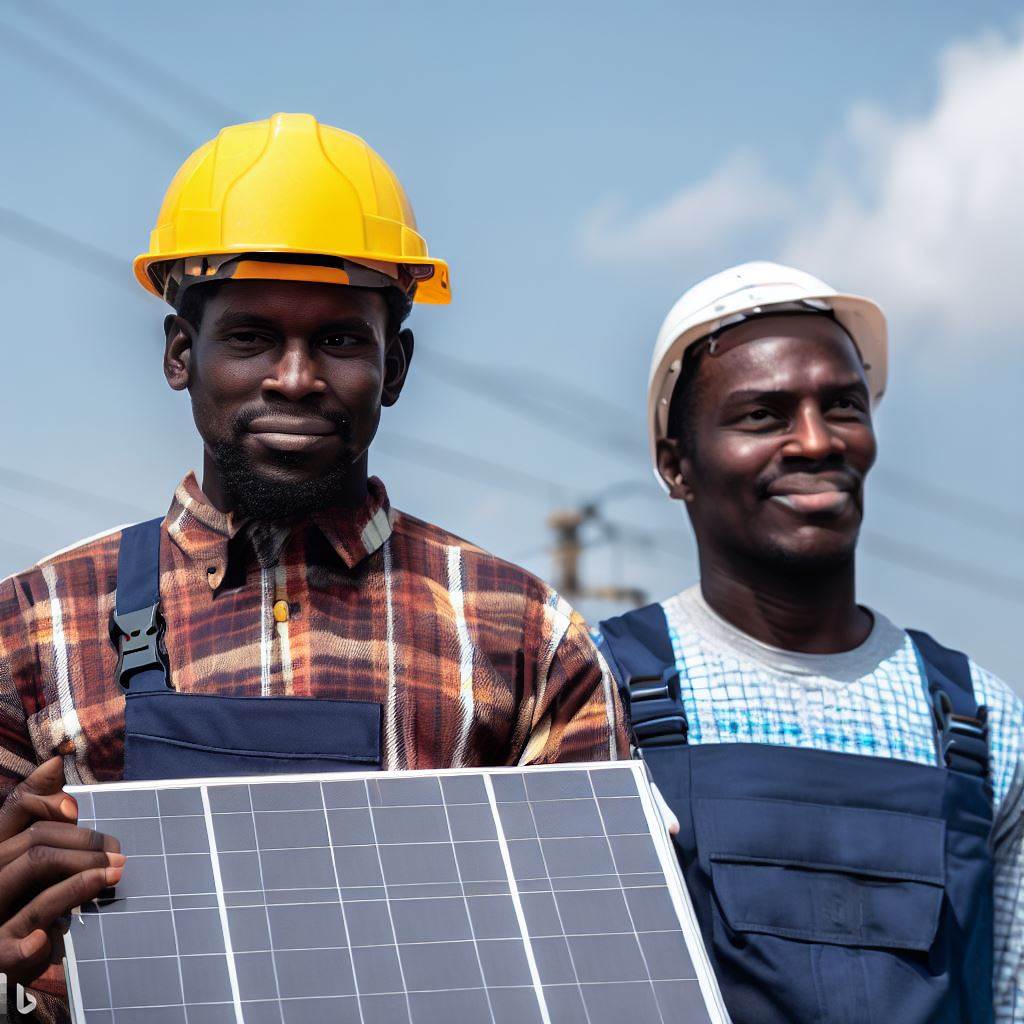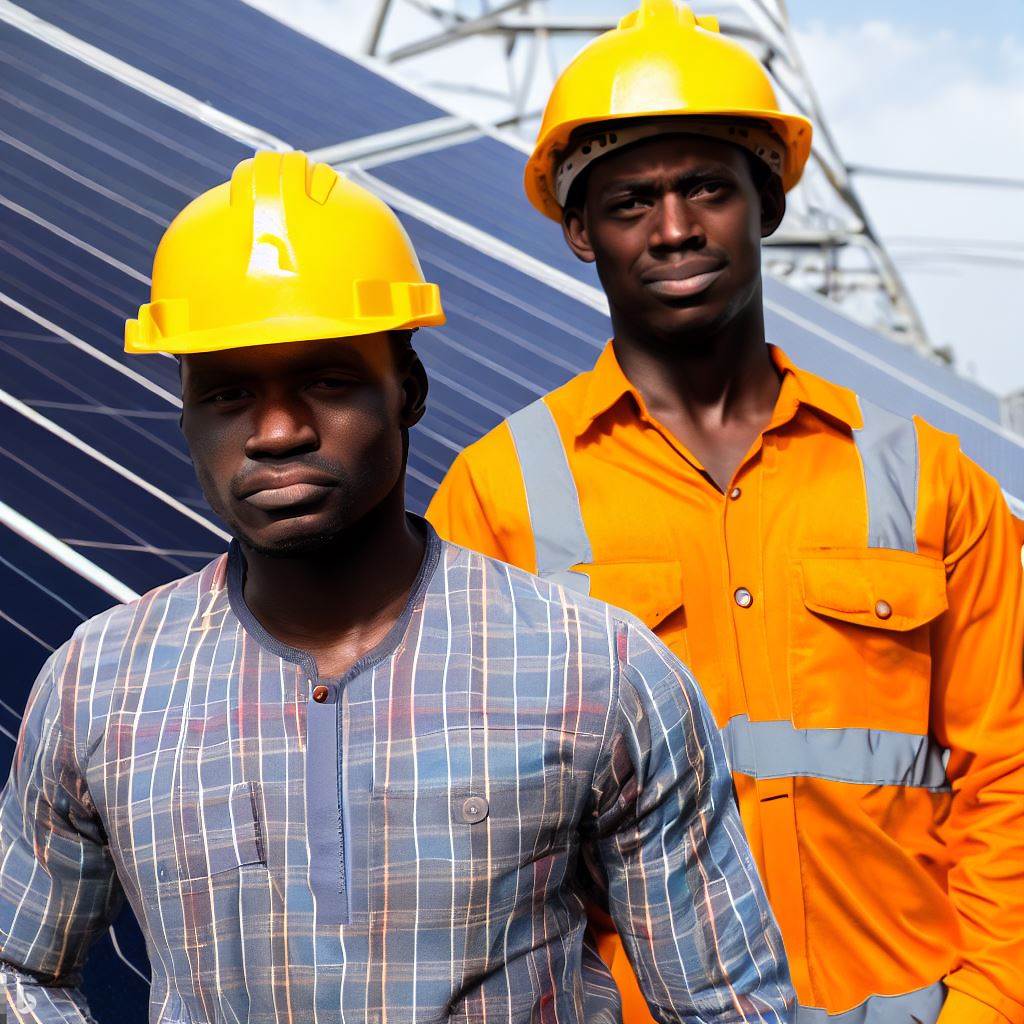Introduction
Let’s talk about training for solar PV installers in Nigeria.
Solar energy is becoming increasingly popular in Nigeria as a renewable and sustainable energy resource.
As the country faces challenges such as poor access to electricity and unreliable power supply, solar energy offers a promising solution.
Nigeria has abundant sunlight throughout the year, making solar energy a viable option for meeting the country’s growing energy demands.
Briefly explain the importance of solar energy in Nigeria
Solar energy is crucial in Nigeria as it helps to diversify the energy mix and reduce dependence on fossil fuels.
It provides clean and reliable electricity to rural and off-grid areas, enabling economic development, improving healthcare, and enhancing education opportunities.
Solar energy also helps to mitigate climate change by reducing carbon emissions, improving air quality, and promoting sustainable development.
Highlight the growing demand for solar PV installations in the country
There is a surge in demand for solar PV installations in Nigeria due to various factors.
The country’s population is rapidly increasing, leading to an increase in energy consumption.
Basically, the high cost of grid electricity and frequent power outages have pushed individuals and businesses to seek alternative energy solutions like solar PV.
Government policies and incentives supporting solar energy have further accelerated this demand.
Generally, solar energy is playing a pivotal role in addressing Nigeria’s energy challenges.
The abundance of sunlight, coupled with the numerous benefits it offers, positions solar energy as a vital component of the country’s energy transition.
With the growing demand for solar PV installations, there is a need for well-trained solar PV installers who can effectively design, install, and maintain solar systems.
This blog section will explore the training initiatives available for solar PV installers in Nigeria and their significance in meeting the increasing demand for solar energy in the country.
Current state of solar PV training in Nigeria
Solar PV training in Nigeria faces challenges:
- Limited program availability due to scarcity of comprehensive institutions.
- High training costs, hindering affordability.
- Lack of government prioritization.
- Inadequate infrastructure affecting hands-on experience.
- Shortage of qualified trainers.
- Language barriers limit accessibility.
- Ineffective curriculum with theoretical focus.
Standardized certifications are lacking:
- Varying training quality.
- Credibility issues for employers.
- Customer confusion about installer qualifications.
- Hindered career advancement.
- Missed international collaboration opportunities.
Solutions for improvement:
- Government must invest in training.
- Partner with international institutions.
- Develop localized materials.
- Establish certification bodies.
- Prioritize hands-on training.
- Explore affordable funding options.
- Encourage continuous professional development.
In summary, Nigeria’s solar PV training faces challenges in availability, affordability, and certification standardization.
Addressing these issues through government support, partnerships, and practical training can enhance the industry’s quality and accessibility.
Read: Solar PV Installer: Skills Needed in Nigeria
The need for comprehensive training programs
In order to accelerate the adoption of solar photovoltaic (PV) technology in Nigeria, there is a dire need for comprehensive training programs tailored for PV installers.
These programs are essential in equipping individuals with the necessary skills and knowledge to excel in this growing industry.
Benefits of Well-Trained Solar PV Installers
- Improved Installation Efficiency: Well-trained PV installers can carry out installations more efficiently, ensuring maximum energy production and system reliability.
- Higher Quality Installations: With comprehensive training, installers will understand the technical requirements and best practices to deliver high-quality solar PV installations.
- Enhanced System Performance: Proper installation techniques and knowledge of different system components allow well-trained installers to optimize system performance, maximizing energy yields.
- Reduced Maintenance Costs: Inadequate training often leads to installation errors, which can result in frequent maintenance requirements. Well-trained installers can minimize such issues, reducing maintenance costs.
- Customer Satisfaction: A well-trained installer ensures a smooth and hassle-free installation process, leading to satisfied customers who will also be more likely to promote solar PV systems.
Job Creation and Economic Growth
By investing in training programs for solar PV installers, Nigeria can unlock the potential for job creation and economic growth:
- Employment Opportunities: As the demand for solar PV systems increases, there will be a surge in job opportunities for trained installers, stimulating job creation.
- Sustainable Industry Growth: Trained installers contribute to the growth of the renewable energy industry, fostering economic development and reducing dependency on fossil fuels.
- Local Entrepreneurship: Well-trained PV installers can leverage their skills to establish their own solar installation businesses, driving entrepreneurship and local economic empowerment.
- Investment Attraction: A skilled workforce in the solar PV sector attracts investments from both local and international businesses, boosting the overall economy.
Importance of Safety and Quality Assurance
Ensuring safety and quality assurance in solar PV installations is of utmost importance:
- Minimize Accidents and Hazards: Training programs educate installers about safety measures, reducing the risk of accidents and hazards during installation and maintenance processes.
- Compliance with Standards: Well-trained installers understand the regulatory framework and adhere to industry standards, ensuring installations meet safety and quality requirements.
- Long-Term System Reliability: Proper installation techniques and quality assurance practices result in reliable systems that operate effectively over their intended lifespan.
- Customer Confidence: Emphasizing safety and quality assurance instills confidence in consumers, fostering a positive image for the solar PV industry and encouraging its growth.
In essence, comprehensive training programs for solar PV installers are essential for the proliferation of solar energy in Nigeria.
Such programs not only lead to well-trained installers who can efficiently carry out high-quality installations, but also unlock job opportunities, drive economic growth, and ensure safety and reliability in the industry.
It is crucial for stakeholders to establish and support these training initiatives to reap the benefits and accelerate the transition to a sustainable energy future for Nigeria.
Read: Solar PV Installer Jobs in Nigeria: An Overview

Learn More: Effective Fundraising Strategies in Nigeria’s Landscape
Existing training initiatives in Nigeria
- Local training institutions and organizations have made efforts to provide training for solar PV installers.
- These initiatives aim to meet the growing demand for skilled workers in the solar industry.
- Some organizations offer short-term training courses, while others provide comprehensive programs.
- Training initiatives focus on equipping individuals with technical knowledge and practical skills to install solar PV systems.
- These programs also cover topics such as system design, maintenance, and safety practices.
Efforts made by local training institutions and organizations
- The Renewable Energy Association of Nigeria (REAN) plays a crucial role in developing training programs.
- REAN collaborates with training providers to ensure the quality and relevance of training courses.
- Some institutions offer on-the-job training, allowing trainees to gain hands-on experience.
- Training centers often have well-equipped laboratories and simulated solar PV installation setups.
- These facilities enable trainees to practice their skills in a real-life setting.
Successful programs and their impact on the industry
- The Solar Energy Training Program by Solar Nigeria offers comprehensive training to professionals in the sector.
- Graduates from this program have significantly contributed to the growth of the solar PV installation industry.
- Many successful installers have started their businesses and created employment opportunities.
- These programs have also played a crucial role in increasing access to renewable energy in rural areas.
- Solar PV installers trained through these initiatives have helped electrify remote communities.
Partnerships with international organizations to enhance training opportunities
- International organizations such as the International Renewable Energy Agency (IRENA) collaborate with Nigerian institutions.
- These partnerships bring expertise, funding, and resources to improve the quality of training programs.
- IRENA provides train-the-trainer programs, ensuring local trainers are equipped with up-to-date knowledge.
- Partnerships also facilitate knowledge exchange and promote best practices in solar PV installation training.
- By partnering with international organizations, Nigeria can strengthen its workforce in the solar PV industry.
In review, Nigeria has seen significant progress in training solar PV installers through existing initiatives.
Local training institutions and organizations are actively involved in providing comprehensive programs that equip individuals with the necessary skills.
Successful programs have not only created employment opportunities but also contributed to the electrification of rural areas.
Partnerships with international organizations further enhance training opportunities, ensuring the industry continues to grow.
These collaborative efforts are vital for a sustainable and thriving solar PV installation industry in Nigeria.
Read: The Role of Solar PV Installers in Nigeria’s Grid
Recommendations for Improving Solar PV Training in Nigeria
Call for Government Support and Funding for Training Initiatives
- The government should allocate a budget specifically for solar PV training programs.
- Funding should be provided to establish training centers equipped with modern facilities and resources.
- Financial incentives should be given to individuals or organizations that offer solar PV training programs.
- Scholarships and grants should be available to encourage more people to participate in solar PV training.
Emphasize the Importance of Standardized Certification Processes
- Establish a national solar PV certification board to ensure consistent and high-quality training.
- Define clear and standardized competency requirements for solar PV installers.
- Develop a comprehensive curriculum that covers theoretical knowledge and practical skills.
- Regularly update certification requirements to align with technological advancements in the industry.
Suggest the Inclusion of Practical On-the-Job Training to Enhance Skills and Experience
- Encourage collaboration between training institutes and solar PV installation companies.
- Provide internship opportunities for trainees to work under experienced professionals.
- Create apprenticeship programs where trainees can gain hands-on experience in real-world installation projects.
- Organize workshops and simulation exercises to simulate practical installation scenarios.
By implementing these recommendations, the solar PV training landscape in Nigeria can be greatly improved.
Government support and funding will ensure the availability of comprehensive training programs and resources.
Standardizing certification processes will enhance the credibility of solar PV installers, increasing consumer confidence in the industry.
Including practical on-the-job training will bridge the gap between theoretical knowledge and real-world experience, preparing installers for the challenges they may face in the field.
This approach will not only provide trainees with the necessary skills but also foster innovation and problem-solving abilities.
Therefore, the adoption of standardized certification processes will elevate the professionalism of solar PV installers, attracting more investments and job opportunities in the renewable energy sector.
Standardized competencies will also facilitate mobility within the industry, allowing installers to work in different regions without the need for additional training or re-certification.
In short, involving industry experts in the development and execution of training programs will ensure that the curriculum remains up-to-date with the latest technological advancements.
This will equip trainees with the knowledge and skills required to handle emerging solar PV technologies.
In a nutshell, a concerted effort from the government, training institutes, and industry stakeholders is necessary to enhance solar PV training in Nigeria.
By allocating resources, creating standardized certification processes, and providing practical on-the-job training opportunities, the country’s solar PV workforce will be well-equipped to drive the adoption of renewable energy and contribute to sustainable development.
Read: Leading Political Scientists: Profiles from Nigeria
Conclusion
When all is said and done, we have discussed the key points regarding solar PV training in Nigeria.
It is clear that investing in such training is crucial for Nigeria’s sustainable energy future.
By equipping individuals with the necessary skills, we can accelerate the adoption of solar PV systems and contribute to a cleaner and more sustainable energy sector.
Proper training will ensure the safe and efficient installation of solar PV systems, leading to increased reliability and longevity.
To sum it up, investing in solar PV training will create job opportunities and empower local communities.
As Nigeria strives to diversify its energy mix and reduce reliance on fossil fuels, the importance of training for solar PV installers cannot be overstated.
It is a vital step towards achieving a greener and more sustainable future for Nigeria.




